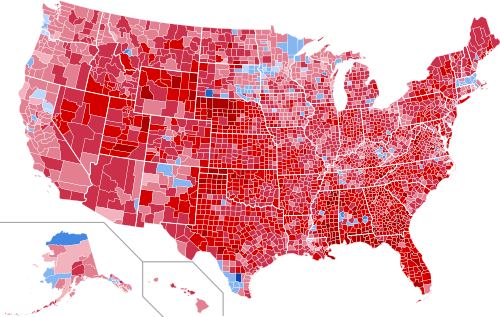1972 United States presidential election
The 1972 United States presidential election was the 47th quadrennial presidential election held on Tuesday, November 7, 1972. Incumbent Republican president Richard Nixon defeated Democratic U.S. senator George McGovern in a landslide victory. With 60.7% of the popular vote, Richard Nixon won the largest share of the popular vote for the Republican Party in any presidential elections.
538 members of the Electoral College
270 electoral votes needed to win
Nixon swept aside challenges from two Republican representatives in the Republican primaries to win renomination. McGovern, who had played a significant role in changing the Democratic nomination system after the 1968 presidential election, mobilized the anti-Vietnam War movement and other liberal supporters to win his party's nomination. Among the candidates he defeated were early front-runner Edmund Muskie, 1968 nominee Hubert Humphrey, governor George Wallace, and representative Shirley Chisholm.
Nixon emphasized the strong economy and his success in foreign affairs, while McGovern ran on a platform calling for an immediate end to the Vietnam War and the institution of a guaranteed minimum income. Nixon maintained a large lead in polling. Separately, Nixon's reelection committee broke into the Watergate complex to wiretap the Democratic National Committee's headquarters as part of the Watergate scandal. McGovern's general election campaign was damaged early on by revelations from his running mate Thomas Eagleton, as well as the perception that McGovern's platform was radical. Eagleton had undergone electroconvulsive therapy as a treatment for depression, and he was replaced by Sargent Shriver after only nineteen days on the ticket.
Nixon won the election in a landslide victory, taking 60.7% of the popular vote and carrying 49 states and becoming the first Republican to sweep the South, whereas McGovern took just 37.5% of the popular vote. Meanwhile, this marked the last time the Republican nominee carried Minnesota in a presidential election. This also made Nixon the first two-term vice president to be elected president twice. The 1972 election was the first since the ratification of the 26th Amendment, which lowered the voting age from 21 to 18, further expanding the electorate.
Both Nixon and his vice president Spiro Agnew would resign from office within two years of the election. The latter resigned due to a bribery scandal in October 1973, and the former resigned in the face of likely impeachment and conviction as a result of the Watergate scandal in August 1974. Republican House Minority Leader Gerald Ford replaced Agnew as vice president in December 1973, and thus, replaced Nixon as president in August 1974. Ford remains the only person in American history to become president without winning an election for president or vice president.
Despite this election delivering Nixon's greatest electoral triumph, Nixon later wrote in his memoirs that "it was one of the most frustrating and in many ways the least satisfying of all".[2]
Voter demographics[edit]
Nixon won 36 percent of the Democratic vote, according to an exit poll conducted for CBS News by George Fine Research, Inc.[61] This represents more than twice the percentage of voters who typically defect from their party in presidential elections. Nixon also became the first Republican presidential candidate in American history to win the Roman Catholic vote (53–46), and the first in recent history to win the blue-collar vote, which he won by a 5-to-4 margin. McGovern narrowly won the union vote (50–48), though this difference was within the survey's margin of error of 2 percentage points. McGovern also narrowly won the youth vote (i. e., those aged 18 to 24) 52–46, a narrower margin than many of his strategists had predicted. Early on, the McGovern campaign also significantly over-estimated the number of young people who would vote in the election: They predicted that 18 million would have voted in total, but exit polls indicate that the actual number was about 12 million. McGovern did win comfortably among both African-American and Jewish voters, but by somewhat smaller margins than usual for a Democratic candidate.[61] McGovern won the African American vote by 87% to Nixon's 13%.[62]
